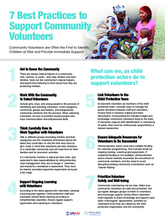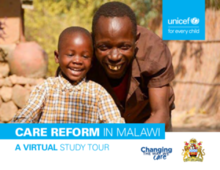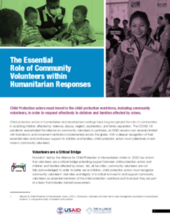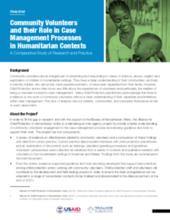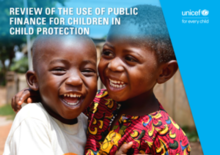childrens_living_arrangement
children_living_without_bio
Displaying 21 - 30 of 104
A poster for Child Protection teams to emphasize the evidence based practices of engaging volunteers that were documented in the research.
This virtual study tour aims to provide you with an overview of care reform in Malawi from the comfort of your own home. Care reform relates to the care of children. It refers to efforts to improve the legal and policy frameworks, structures, services, supports and resources that determine and deliver alternative care, prevent family separation and support families to care for children well.
These presentations from UNICEF and Alternative Care Thailand were delivered during the July 9, 2021, workshop of the Care Measurement Task Force of the Transforming Children's Care Global Collaborative Platform. The focus of the workshop was on care measurement initiatives in Eastern and Southern Africa and Thailand.
This is a 3-page document targeting donors, policy makers, and UN agencies regarding the roles of volunteers and how decision makers can support their roles
The Alliance for Child Protection in Humanitarian Action undertook an inter-agency project to provide a better understanding of community volunteers’ engagement in the case management process and develop guidance and tools to support their work.
The purpose of this review is to explore how UNICEF country offices have used Public Finance for Children (PF4C) analyses and interventions within child protection, with a view to learning lessons from their experiences.
"Children who were fostered by the Social Welfare Office in 1997 and were allegedly given to an orphanage, were reunited with their biological mother at an emotional ceremony on Monday in Mchinji," according to this article.
Vulnerable children and families need a strong social support network that acts as a safety net to effectively and sustainably respond to the situation of children and families at risk.
This paper examines all policy and laws related to families in the South, West, East and Central regions of sub-Saharan Africa.
The special issue of Emerging Adulthood titled “Care-Leaving in Africa” is the first collection of essays on care-leaving by African scholars. This article, coauthored by scholars from North and South, argues in favor of North–South dialogue but highlights several challenges inherent in this, including the indigenizing and thus marginalizing of African experience and scholarship and divergent constructions of key social concepts.

